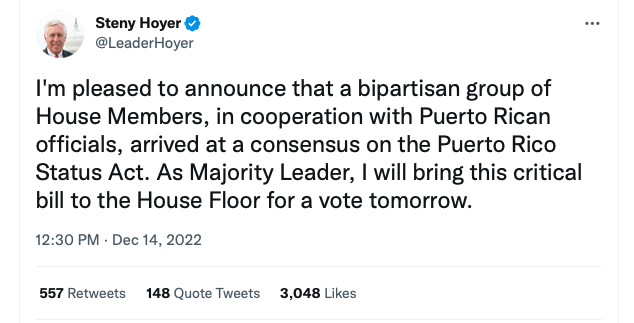House Majority Leader Steny Hoyer has just announced that a vote will be taken on HR8393, the Puerto Rico Status Act, tomorrow.
What is HR8393?
HR8393, the Puerto Rico Status Act, gives the voters of Puerto Rico an opportunity to choose a permanent political status. This bill will end Puerto Rico’s current territory status and give voters the choice of three options, all of which are viable under the U.,S. Constitution:
- Statehood
- Independence
- Free Association
The bill includes specific guidance on citizenship and on the transition from the current status, as an unincorporated territory, and the eventual permanent status.
There will be a final referendum on the three options. If there is a majority for any option, that will become the permanent status of Puerto Rico. If there is no majority for any of the options, there will be a run-off vote to determine the winning choice.
Blank ballots or ballots with more than one option chosen will not be counted.
Status definitions
The three status options are defined as follows:
- “INDEPENDENCE. Puerto Rico is a sovereign nation that has full authority and responsibility over its territory and population under a constitution of its own adoption which shall be the supreme law of the nation.”
- “SOVEREIGNTY IN FREE ASSOCIATION WITH THE UNITED STATES. Puerto Rico is a sovereign nation that has full authority and responsibility over its territory and population under a constitution of its own adoption which shall be the supreme law of the nation.”
- “STATEHOOD The State of Puerto Rico is admitted into the Union on an equal footing with the other States in all respects whatever and is a part of the permanent union of the United States of America, subject to the United States Constitution, with powers not prohibited by the Constitution to the States and reserved to the State of Puerto Rico or to its residents.”
Whichever option wins the referendum vote, Puerto Rico will no longer be a colony of the United States. Ut will no longer be a territory of the United States. It will have the sovereignty of a state or of a nation.
What’s next?
Once the vote has taken place in the House, the measure must also go to the Senate before being signed by the president.
The essential action to take right now is to contact your representative, especially if you live in a state. Your Congressional Representative needs to hear from you and know that the people who voted for him or her want a positive vote on HR 8393.








One response
WHY PUERTO RICO WILL NOT BE A STATE: The Republicans will never allow a people with a large number of Democratic enrollment, into the union. It is against their best political interest. Secondly, Puerto Rico has a large population than over 20 U.S. states of the union. Becoming a state, Puerto Rico would become more politically powerful than these 20-plus U.S. states. Even if the Democrats were in full control of the government, these states would not allow it.